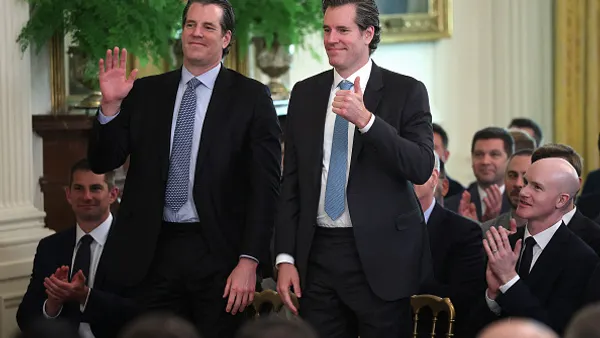Dive Brief:
- Companies seeking their next finance chief are on the hunt for “tried and true” finance leaders that can help them navigate choppy economic seas, Jim Lawson, co-leader of executive search and leadership advisory firm Russell Reynolds Associates’ CFO practice told CFO Dive, with the appointments of first-time CFOs inching downwards in the year’s first quarter.
- Though most new CFO appointments in Q1 2025 (58%) were internal hires, of those that were external hires, “experienced CFOs are increasingly favored,” Russell Reynolds’ Q1 2025 CFO Turnover Index found. Experienced CFOs made up 80% of external hires, a quarterly high on par with results seen in 2021, “as some organizations continue to navigate complex economic markets and succession plans fail to materialize,” the report found.
- “If we don't think our bench is ready quite yet, we would love to bring in a super experienced CFO who has been successful a few times and can bring that seniority in some of these turbulent markets,” Lawson said in an interview of how companies are approaching their CFO hiring strategies.
Dive Insight:
Businesses are putting a growing premium on experienced finance chiefs after CFO turnover reached a six-year high in 2024, RRA previously found.
That trend has continued; for the year’s first quarter, 95 CFOs were appointed, compared to 89 appointments in the prior year period, the leadership advisory firm found. Finance chiefs are also reporting shorter tenures; in Q1, the average stint in the top financial seat was 5.8 years, slightly below a six-year, full-year average of 6.2 years, RRA found.
A top factor that has continued to drive CFO turnover is rising retirement rates, in keeping with trends seen in 2024, 60% of departing finance chiefs either retired or moved exclusively to board positions in Q1, with many choosing not to seek new CFO roles due to factors such as burnout or financial security, or simply because now seems like the right time for retirement, according to the report.
However, that growing exodus represents a challenge for businesses today looking for their next finance leader. One of the most troubling trends is “we don't see the same kind of pipeline that we used to see 10 years ago,” said Jenna Fisher, managing director, global financial officers practice and co-leader of the CFO practice for Russell Reynolds Associates.
There’s a narrowing number of new accounting and finance graduates — and moreover, many of the training programs or strategies companies may have historically put into place to hone future finance chiefs have since fallen out of common practice, Fisher said. For example, many companies previously tapped investor relation roles as a kind of “breeding ground” for their next finance chiefs, a tactic that’s become less commonplace today in favor of more specialization.
“Every company wants the best head of investor relations and the best treasurer and the best head of FP&A, and so that heterogeneity of experience, that toolkit building, is harder to come by for many aspiring CFOs than it was five, 10 years ago,” Fisher said. “And so we see a continued struggle in terms of the supply, demand imbalance for CFOs.”
Businesses on the hunt for their next finance chief aren’t just searching for leaders with financial chops — though such skills are still key — but for CFOs with “effective communication skills,” Lawson said.
“Effective communication with the board, with the CEO, with the street or investors, that ask has been amplified,” when it comes to firms seeking out their next finance leader, he said.
As the demand for experienced finance chiefs becomes more acute, it’s critical for companies to find ways to nurture upcoming talent as a way to bridge the supply, demand gap, Fisher said. Russell Reynolds offers a CFO mentor program which works to pair first-time CFOs with finance chiefs who have recently retired, she said.
“We really believe that there need to be more mechanisms for developing excellent CFOs, because we don't see CFOs fail generally, because of a lack of skill set,” Fisher said. “Generally, it's because they're failing on some of the quote, unquote, softer dimensions. It's communication with the board and CEO. It's the ability to inspire and develop and retain their team.”















